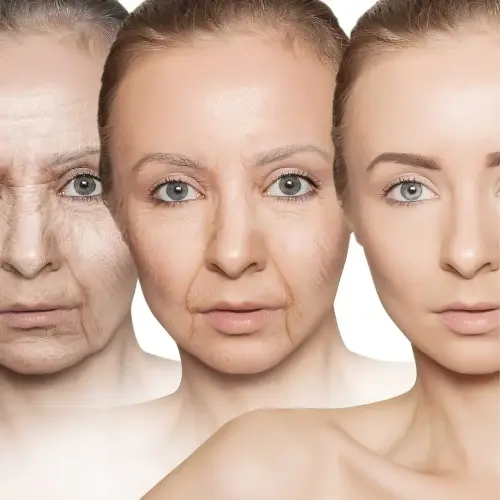Are Microplastics Making You Age Faster?

In today’s world, plastic is everywhere—from the packaging of our food to the very air we breathe. But what if these microscopic plastic particles, known as microplastics, are not just an environmental issue but also a direct threat to your health? More alarmingly, could they be accelerating the aging process? Scientists are now uncovering the hidden dangers of microplastics, and the findings are startling.
The Hidden Threat in Your Daily Life
Picture this: You sit down to enjoy your morning cup of tea, unaware that billions of tiny plastic particles are seeping into your body. Studies have shown that the average person consumes approximately 5 grams of plastic every week—the equivalent of a credit card. Microplastics have been detected in food, drinking water, and even the air, making exposure virtually unavoidable. But while their presence is concerning, their impact on human health—particularly aging—raises even greater alarms.
Experts warn that these plastic particles do not simply pass through our systems; instead, they accumulate in our bodies, triggering oxidative stress, inflammation, and hormonal imbalances. These processes are closely linked to premature aging, meaning that microplastics could be silently accelerating the breakdown of our cells, skin, and overall health.
What Are Microplastics & Where Do They Come From?

Microplastics are tiny plastic fragments measuring less than five millimeters, with some as small as a virus. These minuscule particles originate from everyday items such as:
- Bottled water
- Plastic tea bags
- Food packaging
- Synthetic clothing
- Skincare and cosmetics
The breakdown of plastic over time, combined with manufacturing processes, continuously releases these particles into our environment. One study found that a single plastic tea bag can release billions of microplastics into a single cup of tea. Given the pervasiveness of plastic in modern society, exposure is nearly unavoidable.
How Microplastics Accelerate Aging
Scientists have identified several ways in which microplastics contribute to premature aging:
- Oxidative Stress & Wrinkles
Microplastics trigger an overproduction of free radicals—unstable molecules that damage cells, proteins, and DNA. This oxidative stress breaks down collagen, a crucial protein for maintaining youthful, firm skin. Over time, this leads to visible signs of aging, including wrinkles, sagging, and uneven skin tone.
- Chronic Inflammation – The Silent Killer
Chronic inflammation is one of the leading causes of age-related diseases such as arthritis, diabetes, and dementia. Research shows that microplastics irritate the immune system, keeping the body in a constant state of low-grade inflammation. This ongoing stress weakens the body’s natural defenses and accelerates aging at a cellular level.
- Hormonal Disruption & Weight Gain
Many plastics contain endocrine-disrupting chemicals like BPA and phthalates. These compounds mimic or block natural hormones, leading to imbalances that can affect metabolism, weight, and overall well-being. Disruptions to estrogen and thyroid hormone levels have been linked to fatigue, weight gain, and mood swings—all symptoms commonly associated with aging.
- Gut Health & Immune System Decline
The gut plays a vital role in overall health and longevity. However, microplastics have been found to disrupt gut microbiota, reducing the body’s ability to absorb nutrients, maintain energy levels, and fight off infections. An imbalanced gut microbiome can lead to fatigue, digestive issues, and weakened immunity, all of which contribute to accelerated aging.
Where Are You Getting the Most Microplastics?
While microplastics are found everywhere, some of the worst offenders include:
- Bottled water: Research suggests that bottled water contains significantly more microplastics than tap water.
- Fast food containers: Hot food can cause plastic packaging to leach harmful chemicals into the meal.
- Tea bags: Many commercial tea bags contain plastic fibers that release microplastics when steeped in hot water.
- Synthetic fabrics: Washing polyester and other synthetic fabrics releases millions of microplastics into waterways, which then enter the food chain.
How to Reduce Microplastic Exposure
Although avoiding microplastics completely is nearly impossible, there are practical steps you can take to minimize exposure:
- Drink from glass or stainless steel bottles instead of plastic.
- Use loose-leaf tea with a metal infuser instead of plastic tea bags.
- Avoid microwaving food in plastic containers.
- Choose natural fabrics like cotton or wool over synthetic materials.
- Check labels on skincare and cosmetic products for microplastic ingredients.
Even small lifestyle changes can significantly reduce the amount of plastic entering your body, ultimately helping to slow down the aging process.
Detoxing Microplastics from Your Body

While prevention is key, detoxification can help eliminate some of the microplastics that have already accumulated in your system. Some of the best strategies include:
- Eating antioxidant-rich foods: Berries, leafy greens, and nuts help combat oxidative stress.
- Staying hydrated: Drinking plenty of water supports kidney and liver function, essential for detoxification.
- Increasing fiber intake: Fiber-rich foods promote digestion and the natural elimination of toxins.
- Sweating it out: Regular exercise and sauna sessions encourage toxin release through perspiration.
By supporting your body’s natural detox pathways, you can help counteract some of the harmful effects of microplastic exposure.
What You Can Do Today
Aging is a natural process, but premature aging caused by environmental toxins like microplastics is preventable. By making conscious choices today, you can protect your health and maintain a youthful appearance for years to come.
Consider taking small but impactful steps, such as switching to a reusable water bottle, avoiding plastic-wrapped food, and choosing natural clothing materials. Your future self will thank you for these mindful changes.
So, the question remains—what will you do today to reduce your exposure to microplastics and support your long-term health?
